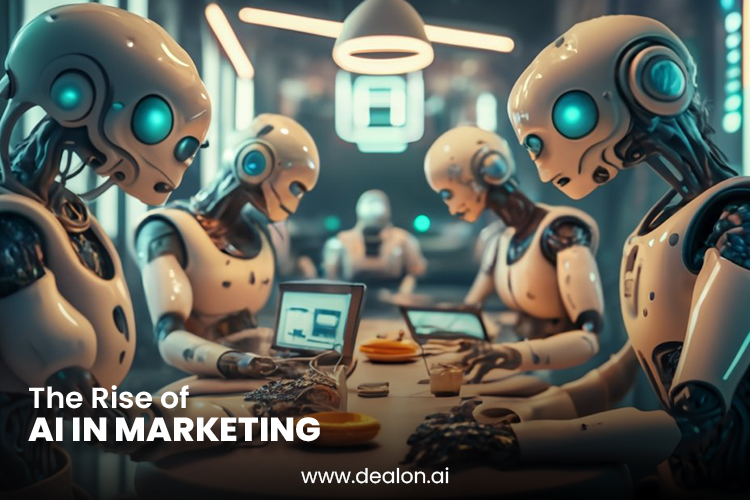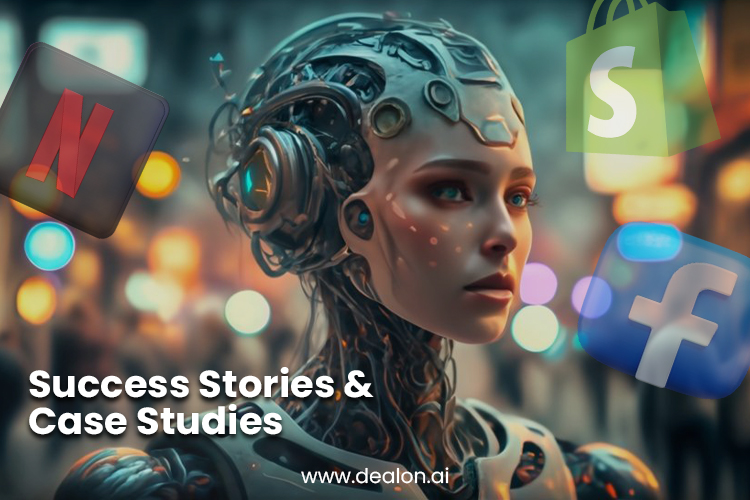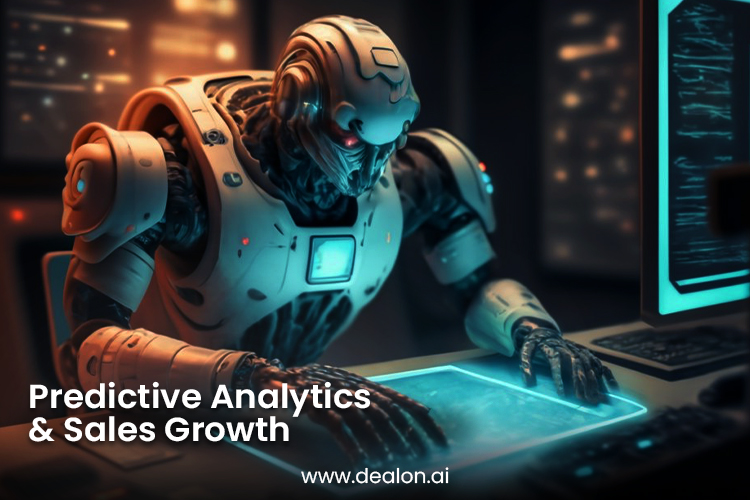In the rapidly evolving landscape of digital marketing, characterized by the swift emergence and fading of trends, like fleeting shadows, Artificial Intelligence (AI) has become the guiding beacon lighting the way to unparalleled success. The fusion of advanced technologies, machine learning algorithms, and data analytics has given birth to a new era in marketing, one where businesses can seamlessly connect with their audience in ways previously deemed unimaginable.
The advent of AI in digital marketing signifies more than a technological evolution; it represents a seismic shift in how businesses approach customer engagement, data analysis, and overall strategy formulation. Gone are the days of generic, one-size-fits-all marketing approaches.
AI has introduced a period of intense personalization, enabling businesses to customize their messages and offerings to individual preferences with unparalleled precision.
At the core of AI’s transformative power lies its ability to process vast amounts of data at speeds far beyond human capability. Machine learning algorithms, a subset of AI, learn and adapt from this data, continuously refining their understanding of consumer behavior. This dynamic process enables businesses to anticipate customer needs, tailor content, and deliver personalized experiences that resonate profoundly.
One notable aspect of AI’s impact is the redefinition of customer journeys. Traditionally, marketing strategies followed a linear model to guide consumers through a predetermined path. AI, however, recognizes the non-linear and unpredictable nature of modern consumer behavior. It adapts in real-time, ensuring that marketing efforts remain relevant and engaging throughout the customer’s journey.
AI-driven analytics have become the cornerstone of informed decision-making. The depth and granularity of insights provided by AI tools empower marketers to decipher patterns, identify trends, and extract actionable intelligence from the vast ocean of data available. This, in turn, allows for more effective allocation of resources, optimization of campaigns, and the ability to seize emerging opportunities swiftly.
The dynamic duo of AI and data analytics is not confined to reactive strategies. Predictive analytics, another facet of AI, enables businesses to forecast future trends and behaviors. This foresight is invaluable, offering businesses a competitive edge by allowing them to proactively shape strategies based on anticipated shifts in the market landscape.
Beyond data analysis, AI has revolutionized the customer service landscape by integrating chatbots and virtual assistants.
These AI-powered entities provide instantaneous, round-the-clock support, addressing customer queries, resolving issues, and even facilitating transactions. This enhances customer satisfaction and frees human resources to concentrate on more intricate tasks requiring emotional intelligence and creativity. The democratization of AI tools has made these advancements accessible to businesses of all sizes. Whether a startup or an enterprise, organizations can leverage the capabilities of AI to enhance their marketing efforts.
Cloud-based AI solutions and user-friendly interfaces have lowered entry barriers, ensuring that AI’s benefits are not exclusive to tech giants. As we navigate this new era in marketing, the integration of AI is not merely a competitive advantage but a survival imperative. Those who embrace AI-driven strategies will stay afloat in the tumultuous sea of digital marketing and ride the crest of waves toward unparalleled success.
The Rise of AI in Marketing

The ascent of AI in marketing signifies a seismic shift in how businesses engage with their audience, marking a rapid progression from experimental beginnings to an indispensable strategic asset. In its initial phase, AI emerged tentatively as a practical tool, a novel data analysis and automation approach. However, its swift evolution unfolded as marketers recognized its transformative potential.
The journey of AI in marketing has been characterized by an innovative spirit, adapting to the changing digital landscape. Today, AI is not merely an option but a necessity, reflecting a relentless pursuit of precision. Its integration has redefined the marketing landscape, offering dynamic insights, personalized engagements, and predictive analytics, underscoring its pivotal role as a driving force behind the profound changes shaping the future of digital marketing.
Also Read: Top 3 Successful App Marketing Strategies In 2024
Success Stories and Case Studies

Personalization Perfected – Netflix’s Algorithmic Brilliance
Netflix has emerged as a pioneer by perfecting the art of personalized content discovery through its algorithmic brilliance. Unlike traditional broadcasters, Netflix’s success isn’t solely attributed to the vastness of its content library but, crucially, to its mastery in predicting and catering to individual viewer preferences. At the heart of this achievement lies the utilization of sophisticated Artificial Intelligence (AI) algorithms.
Netflix’s algorithms analyze extensive data points, including viewing history, genre preferences, time of day, and how users browse the platform. This wealth of data enables the platform to create highly accurate user profiles, deciphering what content users have enjoyed and predicting what they might want. This personalized content recommendation system is a game-changer, providing users with a curated selection tailored to their tastes.
The intricacies of Netflix’s algorithmic brilliance go beyond mere content recommendations. The platform employs machine learning techniques that continuously evolve and adapt based on user behavior. As viewers engage with the platform, the algorithms learn from every interaction, refining their understanding of individual preferences over time. This dynamic adaptation ensures that Netflix’s recommendations remain meaningful and compelling, nurturing a more profound bond between users and the platform.
The impact of this personalized approach on customer satisfaction and retention cannot be overstated. By offering a curated viewing experience, Netflix captivates audiences and instills a sense of loyalty. Users find themselves drawn to a platform that understands their entertainment preferences and introduces them to new content that aligns with their tastes. Netflix’s algorithmic brilliance has set a benchmark for the industry, showcasing the potential of AI in transforming how content is discovered and consumed.
As other platforms strive to emulate this success, the importance of personalized content discovery in the competitive streaming landscape becomes increasingly evident. Ultimately, Netflix’s innovative use of AI algorithms keeps viewers engaged in the present and positions the platform at the forefront of shaping the future of content consumption in the ever-evolving digital landscape.
Targeted Ad Campaigns – The Facebook Advantage
In the expansive realm of social media, Facebook has carved a niche beyond being a mere platform for connection; it stands as a testament to the unparalleled efficacy of targeted advertising. At the core of Facebook’s advantage lies its sophisticated use of advanced algorithms that meticulously tailor advertisements to reach the most relevant audience, maximizing engagement and conversion rates. A robust combination of user data, machine learning, and predictive analytics underpins the mechanics of Facebook’s targeted ad campaigns.
Facebook’s algorithms analyze extensive user information, including demographics, interests, online behavior, and engagement patterns. This wealth of data enables the platform to create finely segmented user profiles, ensuring that advertisements are precision-targeted to individuals most likely interested in the products or services being promoted. One pivotal feature of Facebook’s targeted advertising is its dynamic retargeting capability. The capability of a brand’s website to engage users who have interacted with it or shown interest in specific products are served relevant ads when they revisit Facebook.
This personalized approach enhances brand recall and encourages users to take desired actions, whether purchasing or engaging with the brand further. Moreover, Facebook’s advertising platform allows businesses to set specific parameters, defining the target audience based on criteria such as age, location, interests, and even online behavior. This level of granularity empowers advertisers to refine their campaigns with surgical precision, ensuring that their messages resonate with the right demographics.
Integrating Artificial Intelligence (AI) plays a pivotal role in this process. Facebook’s algorithms continuously learn and adapt, optimizing ad delivery based on real-time user interactions. This iterative learning process ensures that the platform remains agile in responding to changes in user behavior, thereby maximizing the effectiveness of targeted ad campaigns. For businesses looking to achieve marketing success on a global scale, understanding and leveraging the mechanics of Facebook’s targeted ad campaigns is paramount.
The platform’s ability to harness the power of AI in refining advertising strategies ensures that businesses not only reach their intended audience but also do so with a precision that transcends traditional advertising methods. As a result, Facebook stands as a beacon in the social media landscape, showcasing how the synergy of advanced algorithms and AI can propel targeted advertising to new heights, driving engagement, conversions, and, ultimately, marketing success.
Chatbots and Customer Engagement – Shopify’s Triumph:
In the dynamic landscape of the evolving digital marketplace, customer engagement is a critical determinant of success. Shopify, a prominent player in the e-commerce realm, has distinguished itself by harnessing the power of AI-driven chatbots to revolutionize the customer experience. By implementing these intelligent virtual assistants, Shopify has streamlined customer interactions and elevated overall satisfaction to unprecedented levels.
At the core of Shopify’s triumph lies the seamless integration of AI-driven chatbots into its e-commerce platform. These chatbots, powered by advanced natural language processing algorithms, are designed to engage users in real-time, providing instant and personalized assistance. Whether answering product queries, guiding customers through the purchase process, or addressing post-purchase concerns, these chatbots act as a round-the-clock support system, ensuring that customers have a frictionless and efficient experience.
The critical advantage of AI-driven chatbots is their capacity to adapt and comprehend each interaction. Shopify’s chatbots analyze user inquiries and feedback, refining their responses and understanding of customer needs. The iterative learning process improves the precision of responses and enables chatbots to anticipate user queries, providing a proactive and personalized experience. Shopify’s success in leveraging chatbots extends beyond mere efficiency; it encompasses a fundamental shift in how businesses approach customer interactions.
By offering instant and personalized assistance, Shopify has developed an atmosphere where customers feel valued and supported throughout their journey. This level of engagement fosters customer satisfaction and contributes to building long-lasting relationships, a crucial element in the competitive e-commerce landscape. For businesses aspiring to emulate Shopify’s triumph, the key lies in understanding their customer base’s specific needs and strategically implementing AI-driven chatbots.
Customizing chatbot interactions, aligned with the brand’s tone and values, ensures a seamless integration into the overall customer experience. Moreover, businesses can benefit from the scalability of chatbots, handling numerous interactions simultaneously and freeing up human resources to focus on more complex and nuanced aspects of customer support. In essence, Shopify’s success with AI-driven chatbots is a testament to the transformative power of these intelligent tools in enhancing customer engagement.
As companies persist in navigating the digital marketplace, the strategic incorporation of AI-driven chatbots emerges as a technological asset and a linchpin for creating meaningful and lasting customer connections. Shopify’s triumph serves as a beacon, guiding businesses toward a future where personalized, efficient, and 24/7 customer engagement is not just a goal but a tangible reality.
Predictive Analytics and Sales Growth – Salesforce’s Story:

At the forefront of customer relationship management, Salesforce has not merely embraced but mastered the transformative potential of AI through predictive analytics. This pioneering approach has revolutionized the traditional paradigms of sales strategies, making Salesforce a trailblazer in utilizing artificial intelligence to forecast customer behaviors and trends, enabling businesses to make informed choices and enhance their sales processes for significant growth.
Salesforce’s foray into predictive analytics involves harnessing the capability of machine learning algorithms to scrutinize vast datasets. The platform creates predictive models that forecast future behaviors and trends by examining historical customer interactions, purchase patterns, and engagement metrics. This deep understanding of customer dynamics enables businesses to proactively tailor their sales strategies to meet evolving consumer needs.
One of the critical advantages of Salesforce’s predictive analytics lies in its ability to identify potential leads and opportunities before they manifest. By leveraging AI to predict which leads are more probable to convert into customers, businesses can prioritize their resources effectively, focusing on prospects with higher conversion potential. This not only streamlines the sales process but also maximizes the efficiency of sales teams.
Furthermore, Salesforce’s predictive analytics is pivotal in optimizing marketing efforts. Businesses can fine-tune their marketing campaigns by identifying trends and patterns in customer preferences, ensuring that messages resonate with their target audience. This level of precision enhances the overall customer experience, fostering brand loyalty and contributing to sustained growth.
Salesforce’s story is a testament to the transformative impact of predictive analytics on sales growth. Businesses using Salesforce’s platform gain a competitive edge by making data-driven decisions, reducing guesswork, and aligning their strategies with the evolving market landscape. The platform’s ability to adapt and learn from ongoing interactions ensures that predictive models remain dynamic, providing businesses with relevant insights.

